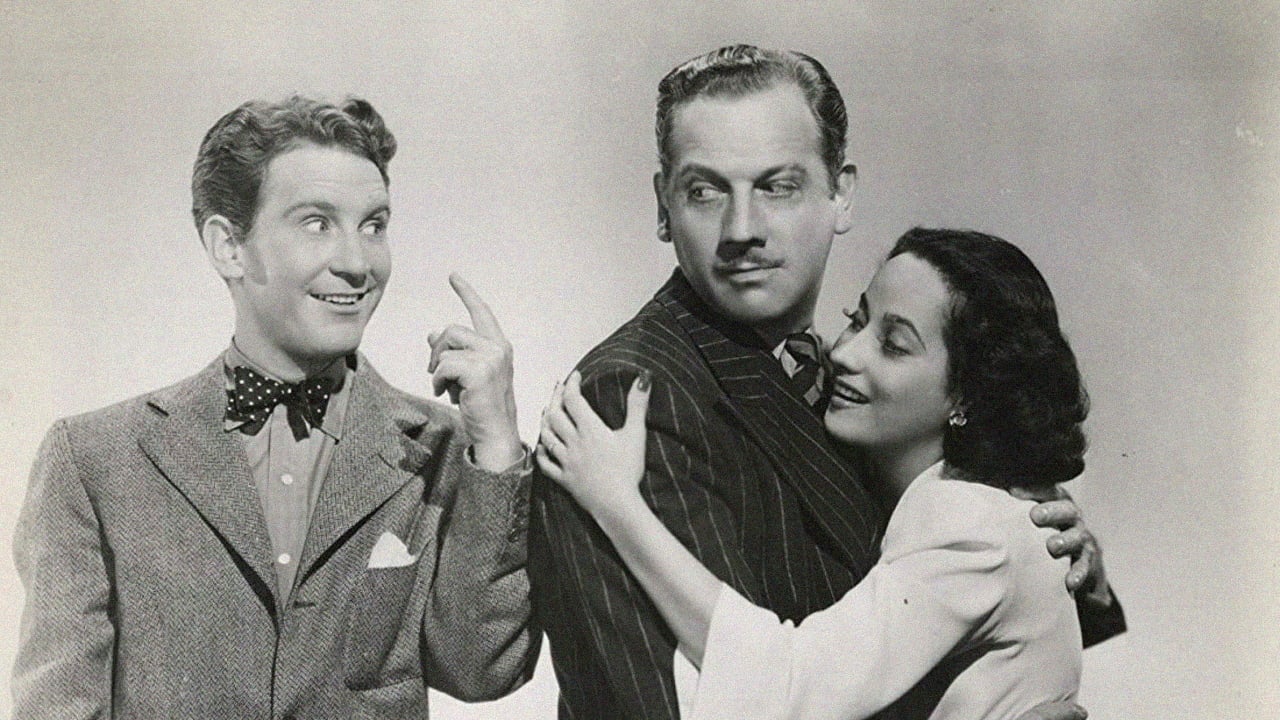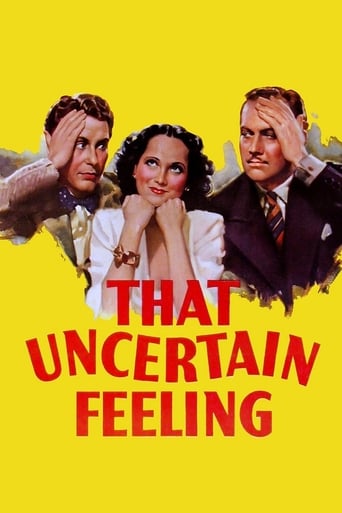

Please don't spend money on this.
... View MoreFantastic!
... View MoreExcellent, smart action film.
... View MoreWorth seeing just to witness how winsome it is.
... View MoreFirst, the good news. A really first-rate pressing of this hard-to- find-a-decent-copy movie is available in the extra-cheap "Hollywood Comedy Legends" set. And now the bad news: Despite the efforts of a first-rate cast, the film is somewhat disappointing and I'm really surprised that Lubitsch regarded the movie with such affection. True, he had a really first-rate roster of players, although all of them (no doubt on Lubitsch's instructions) tend to over-act, especially Burgess Meredith.It's also true that the movie's screenplay presents some good comedy ideas, but they are played to death. We keep waiting for that famed Lubitsch touch, but it never really happens. The film comes across more like a photographed stage play that has been spun out to Three Acts purely for the purpose of giving audiences a run for their money. True, the director takes care to keep things moving, even when the players are not doing or saying anything really amusing, but it's simply not enough to keep audience interest at a high level.
... View MoreLuke warm comedy of manners. The storyline's done with style, but needed verve gives way to too much talk. The results are more sophistication than set-ups, more occasional chuckles than laughs. Larry (Douglas) is a married insurance executive. Trouble is he's neglecting wife Jill (Oberon) who's having hiccup bouts, probably because his main communication is poking her playfully in the stomach. So she takes up with squirrelly Sebastian (Meredith) who's an egotistical man of the arts. Now Larry's unhappy with the results, but what's he to do.Oberon and Douglas both low-key their parts. Add that to a talky script and we get some good lines and situations, but mild results overall. Looks like Meredith's sour artiste was intended to supply needed verve. However, his character is too obnoxious to generate much comedy. Too bad, as other reviewers point out, that Eve Arden's comedic potential goes untapped. Some caustic exchanges between her and Meredith would have livened things up. However, two comedic set-ups do stand out: the office scene where divorce plans keep misfiring, plus the climax where Larry pretends to have a girl in his bedroom to make Jill jealous. In fact, that last scene has the vivacious earmarks of a better total comedy than what we have otherwise.Anyway, it's New York sophistication done Lubitsch style, even if second rank.
... View MoreMerle Oberon and Melvyn Douglas deal with "That Uncertain Feeling," a 1941 Ernst Lubitsch film based on a Sardou play. It's actually a remake of a silent Lubitsch, "Kiss Me Again." The film also stars Burgess Meredith and Eve Arden.Jill Baker (Oberon) is married to a successful businessman, Larry Baker (Douglas), but after six years, the bloom is off the rose. She goes to a psychiatrist, where, in the waiting room, she meets an opinionated pianist, Alexander Sebastian (Meredith), who introduces her to the world of art and music. She becomes fascinated with the world of culture and with him. Before you know it, Oberon and Douglas are divorcing, and Oberon and Meredith become engaged.The best scene occurs in the divorce attorney's office, when the secretary, Sally (Eve Arden) is asked to take a letter. In reality, she's supposed to witness Larry slapping Jill to help them get their divorce.There are some nice things in this film, including the bright performances of the leads, particularly the beautiful Oberon, whose presence shone in many a film.All in all, a disappointing Lubitsch, but Oberon's charm is quite special and always worth seeing.
... View MoreTHAT UNCERTAIN FEELING is based on a French play by Victorien Sardou. He was the leading French dramatist for most of the 19th Century, but his specialty of "the well made play" was lampooned into oblivion by later writers (most notably George Bernard Shaw, who labeled such carefully plotted works as "Sardoodledum"). Actually, like such good 20th Century dramatists as Terrance Rattigan, a really good drama can survive it's structural mechanics if the characterizations stand out to be true. Sardou's serious plays (like his historical plays) are too stiff to work today. But his lighter fare might still be able to work if up-dated.Lubitsch reset the story into modern New York. Melvin Douglas is married to Merle Oberon, and is a successful attorney. But their seemingly happy marriage has hit a dull spot. He is not aware of this but she is noticing his idiosyncrasies, and finding some too annoying for words: His habit of sticking his finger into her middle (playfully, of course) and saying "Keex" drives her up a wall. She tries a popular psychiatrist (Alan Mowbray, in a kind of reprise of a similar role from Lubitsch's DESIRE). Then she goes to an art gallery and meets eccentric pianist Burgess Meredith. He is a man who seems more full of sour, but honest, opinions about everything than he has musical talent. He goes from picture to picture telling Oberon what is wrong with each. "That painting won't live.", he declares of one work. Oberon, who can barely keep looking at it, says, "Thank God for that!".Meredith, with his sour view of most things, is soon ruining one of Douglas's business dinners (for a bunch of Hungarian businessmen, led by Sig Ruman). Douglas has a first rate Hungarian meal, complete with goulash for his guests, and even teaches - or tries to teach Oberon - to say a Hungarian toast for their guests. But Meredith dominates the evening, by insisting on playing a classical piece of piano music, and then 19 variations he has composed on it.Gradually Douglas tries to restore his marriage, but finds Oberon in a deep commitment to Meredith. This leads to one of the best scenes when Douglas and his partner Harry Davenport try to stage an act of cruelty against Oberon for divorce purposes. To do this they have to have Eve Arden as an unsuspecting witness to an escalating argument leading to a slap in the face. But each time Douglas can't bring himself to do it, until he basically downs two or three drinks. In the meantime Arden keeps noticing that Davenport (supposedly giving her dictation) is actually doing everything over and over again, including snapping his fingers at the moment that Douglas and Oberon are supposed to start their argument. The film ends with Oberon considering the good and bad points of Douglas and Meredith, to reach her conclusion about who to stay with. It is an obvious choice, perhaps, and it may seem to take her too long to decide, but the three leads give bright performances (supported by Davenport and Arden and the others). Not on the level of THE MERRY WIDOW or NINOTCHKA, but worth watching for some satisfactory chuckles.
... View More